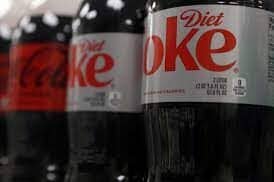In the 1980s, Coca-Cola started adding aspartame to Diet Coke. Numerous goods, including diet drinks, low-sugar jams, yogurts, cereals, and chewing gum, include the artificial sweetener.
According to a research released on Thursday by the World Health Organization, aspartame may “possibly” cause cancer in humans, according to a committee of 25 international experts.
The new classification, which is based on an analysis of “limited evidence,” does not alter the suggested daily intake cap for the artificial sweetener.
Dr. Francesco Branca, head of the WHO’s Department of Nutrition and Food Safety, said during a press conference in Geneva that the results “do not indicate that occasional consumption should pose a risk to most consumers.” He said that “high consumers” of diet soda or other aspartame-containing items have a problem. Branca declared, “We have, in a sense, raised a flag here,” and he urged additional study.
However, citing safety data, the U.S. Food and Drug Administration asserts that it disagrees with this new classification. According to a written statement provided to NPR by an FDA official, the WHO’s classification of aspartame as “possibly carcinogenic to humans” “does not imply that aspartame is actually linked to cancer.”

The permissible daily dose, or ADI, of aspartame has long been capped at 40 milligrams per kilogram of body weight per day by the WHO. Therefore, a person who weighs 60 kilograms (approximately 130 pounds) might take up to 2,400 milligrams per day, which is far more than most people do. This is roughly comparable to 12 cans of Diet Coke.
Branca states that “we’re just advising for a little bit of moderation” despite the WHO maintaining the appropriate daily dose. “The benefit is not there” if people use aspartame to avoid sugar and manage their weight, according to Branca.
Non-sugar sweeteners
The WHO currently advises against the use of non-sugar sweeteners to regulate body weight in light of a review from 2022 that revealed there is no clear consensus regarding their efficacy for long-term weight management.
In the US, aspartame was given the go-ahead to be used as a sweetener in 1974. Coca-Cola started adding the artificial sweetener to Diet Coke in the 1980s and popularized the calorie-free beverage with eye-catching advertising campaigns that emphasized its flavor. Despite its widespread use, there have always been skeptics and detractors, and recent modest studies indicate that artificial sweeteners may change the microbiome and enhance food cravings in some individuals. The World Health Organization set out to review all the data because a few recent studies also suggest possible cancer concerns.
Carcinogenic to humans.
The evidence on aspartame was assessed by two different World Health Organization committees. According to a categorization system used by the International Agency for Research on Cancer, aspartame has a 2B rating, which means it may be “possibly carcinogenic to humans.”
Based on an analysis of numerous studies that used consumption of artificially sweetened beverages as a proxy for aspartame exposure, the agency concluded that there is “limited” evidence that aspartame may cause liver cancer. It also examined the data from a sizable French study, the Nutrient-Santé study, which was published in 2022 and found that aspartame consumption was associated with a 15% increased risk of cancer, particularly malignancies linked to obesity and the breast.




3 Comments
Benny · July 18, 2023 at 11:43 am
babe,coke lazima tukunywe
Karugo · July 20, 2023 at 4:18 pm
health is wealth
Tim · July 20, 2023 at 2:13 pm
Jaber,its one life.